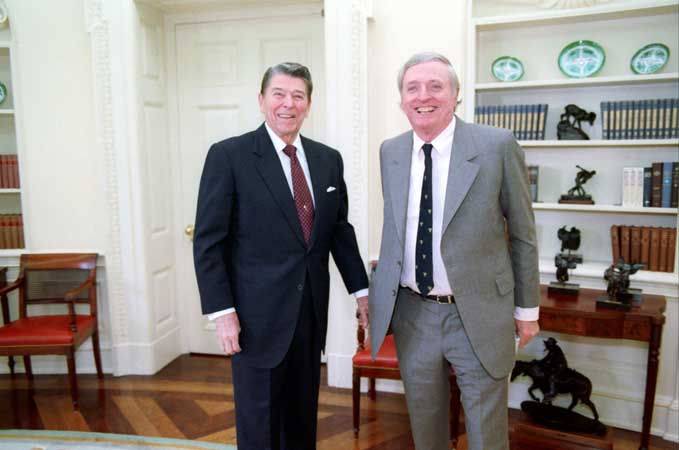Monthly Book Recommendation: April 2019
Getting it Right, by William Buckley, Jr., 2003
William Buckley Jr. is a notable figure for modern conservatives, having helped spark the 20th-century conservative movement and shape contemporary conservative thought. Buckley, an avid writer, helped create the National Review and various other publications focusing on stimulating conservative thought in the mid-20th Century.
Buckley’s 2003 novel Getting it Right defines what many political thinkers would consider the modern conservative. Through it, Buckley described the ideals that the Republican Party ought to adopt in order to achieve a mature movement that will in time make a positive impact on society.
Getting it Right, like much of his work, doesn’t follow one narrative; instead, it’s constructed around individuals reacting to events happening in the world. Through the storyline, Buckley gives a compelling political argument about the importance of differentiating fake conservatism from what he calls traditional conservatism. The title, Getting it Right, refers to Republicans aligning their beliefs with what is now considered traditional conservativism — which for the 1950s and 1960s was a move away from an extremist conservative viewpoint. The views Buckley opposes throughout his book as fake and extremist conservatives are the positions of Ayn Rand and the John Birch Society.
Throughout the book, Buckley argued that the John Birch Society indulged itself so heavily in anti-communism witch hunts that it forgot the roots of conservative thought. Although anti-communism is an aspect of conservative thought, it shouldn’t overshadow perspectives on economics, traditions, and values. Buckley claimed that the John Birch Society became popular within the conservative movement because of the fear-mongering tactics they deployed in support of their extreme stance on communism. Although traditional conservatives believe communism itself is one of the worst creations of mankind, they don’t feel compelled to accuse everyone from congressmen to their next-door neighbor of being communists without a reasonable doubt.
Buckley also opposed the radical viewpoints and philosophy of Ayn Rand, objectivism, which he considered excessive selfishness. As one of Buckley’s characters put it, “The Objectivists pose a special challenge. Because if they succeed in implanting their creed on the Republican Party, it becomes a vessel for…a kind of misanthropic anarchy. The GOP has to beat a path to a wholesome conservatism, and that isn’t helped by anything I’ve read in Ayn Rand.”[1] Buckley’s position, along with many modern conservatives, was that Rand’s belief of objectivism is more libertarian than conservative. This, Buckley believed, would prove unsuccessful in the United States as it promoted a sense of greed that leads to anarchy.
In contrast, Buckley advocated for
candidates that represented the conservative movement’s roots and philosophical
ideals. Buckley famously staked his conservative ground when he made “the
Buckley rule” for National Review:
they would support “the rightwardmost
viable candidate,” intentionally choosing “viable” over “electable.” Buckley’s
philosophy was based around historical conservatism and is opposed to other
so-called conservative movements founded upon brittle concepts like extremism
and populism. He set up what many might call the boundaries of conservatism by
disapproving of the radicals of the conservative movement. Throughout the book,
Buckley advocated for the teachings found within the philosophies of Barry
Goldwater and Ronald Reagan. He called these the basic foundation of modern
conservatism and classical liberalism.
In the
end, the conservatives of the time “got it right” by backing ideas of traditional
conservatism and classical liberalism. Candidates including Barry Goldwater and
Ronald Reagan were major side effects of the explosion of the conservative
movement led by William Buckley in the later 20th century. The ideas of Buckley
prove the importance of sticking to true conservative roots rather than the
elitist selfishness of Ayn Rand and fearful populism of the John Birch Society.
Modern-day conservative thought wouldn’t be the same without the writings of
William Buckley Jr, especially without his book Getting it Right – a novel that exemplifies what it means to be a
conservative.
[1] Buckley, William F., Jr. Getting It Right, a Novel. Washington, D.C.: Regnery, 2004. Pg 101



 PAI is a think tank devoted to research and analysis of political, philosophical, economic, social, and cultural issues from a uniquely Midwestern perspective. We are grounded in the principles of classical conservatism, which has roots in the very foundation of Western civilization and the classical period.
PAI is a think tank devoted to research and analysis of political, philosophical, economic, social, and cultural issues from a uniquely Midwestern perspective. We are grounded in the principles of classical conservatism, which has roots in the very foundation of Western civilization and the classical period.